The environment has always been at the heart of everything we do.
rePurpose Global is committed to tackling the plastic pollution crisis head-on by offering sustainable, eco-friendly alternatives and actively working towards a plastic-neutral future. Together, we are committed to making a tangible difference in protecting our planet and creating a more sustainable future. In this blog post, we will explore the collaboration between Farrington Oils and Repurpose Global, whilst highlighting the shared values and the transformative impact we have achieved in 2022.
Plastic Waste
Global plastic waste production has reached over 400 million tonnes annually. Just 9% of this will be recycled. Most of it will find its way into landfills or leak into nature, creating havoc across coastlines and fragile ecosystems.
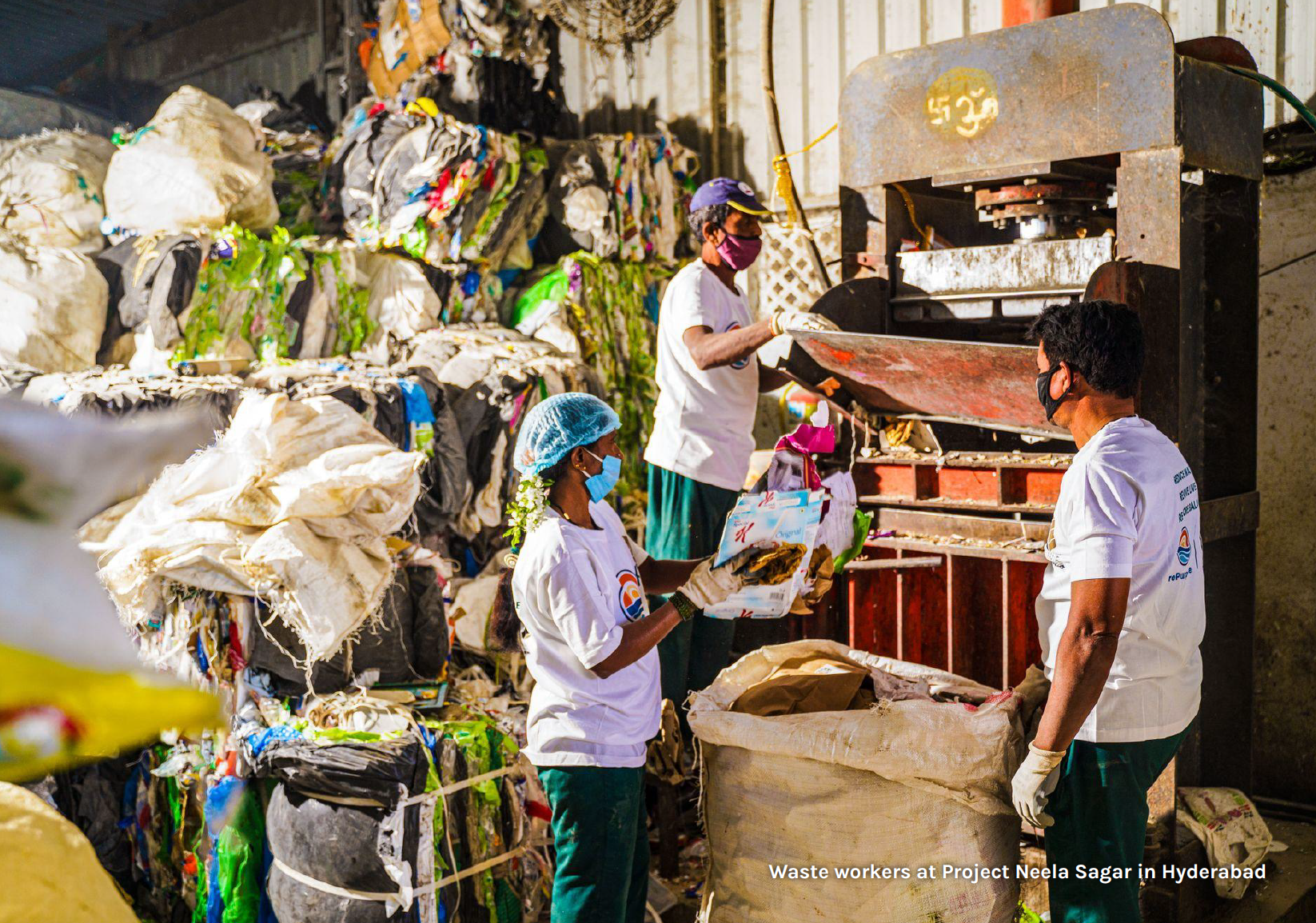
Overall, rePurpose Global, has been able to recover a huge 8,845 tonnes of plastic from nature across 6 countries as of December 2022 – That’s about the weight of 491 Million plastic bottles! Of the 8,845 tonnes of plastic, a massive 862 tonnes of plastic was recovered at Project Neela Sagar alone.
Project Neela Sagar
Through Project Neela Sagar, rePurpose Global endeavours to recover over 9,000 tonnes of low-value plastic waste by 2030, while positively impacting the lives of 1,000+ informal waste collectors.
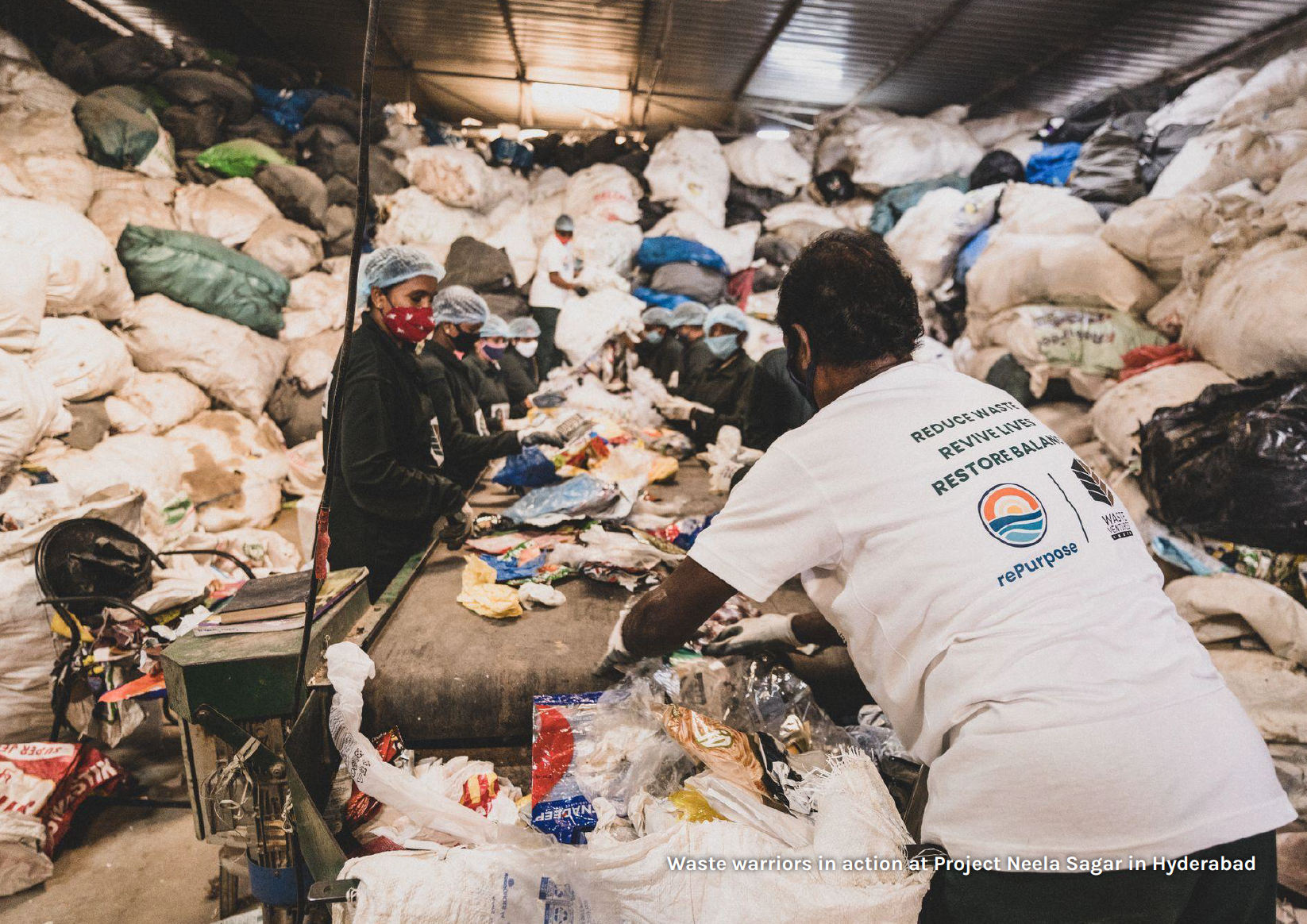
Farrington Oils and rePurpose Global understand the significance of industry leadership in driving sustainable change. By working together, we aim to inspire other businesses within the farming sector to adopt eco-friendly practices. We are deeply committed to sustainability, and our mission is to gradually reduce our plastic footprint year on year.
Becoming Plastic Neutral
You can read how we firstly became Plastic Neutral and the work we have been doing with rePurpose in a previous blog post – simply click here.
If you would like to work out your own plastic footprint, rePurpose have a simple calculator for you here and even have options for individuals to offset their personal footprints and become plastic neutral.
Sources: rePurpose, Neela Sagar 2022 report.
This month is #PlasticFreeJuly and we thought it was the perfect opportunity to share our plastic neutral story…
The environment has always been at the heart of everything we do and earlier this year we took the next step in our sustainability journey and became plastic neutral! Don’t worry if you don’t know exactly what this means, read on and we’ll explain.
Becoming plastic neutral is a lot like becoming carbon neutral which is more commonly understood (and something we have also achieved, read more here) but the general idea is that we now fund the removal of the same amount of plastic from the environment as we use in our packaging, meaning Farrington’s Mellow Yellow is certified as plastic neutral.
MEASURE
The first step in becoming plastic neutral was to measure our plastic footprint. We looked at our products and how they are sent out and started listing all the plastic used at each stage. As our bottles are glass with a metal cap, there isn’t a huge amount of plastic on the product itself, but, for example, the label is plastic, as is the little pourer inside our cap. We also had to look at the way we send out our products. When sending large quantities of our glass bottles to supermarkets, we have to wrap each pallet in plastic wrap to stop breakages which would lead to food waste, so this plastic had to be counted.
Once we had a list of all the plastic used, we worked out how much each item weighed and how much of it we use in a year, and this created our yearly plastic footprint. With this figure, we had a really accurate representation of the amount of plastic that we, as a company, are putting into the environment each year. This is our plastic footprint.
OFFSET
Once we had our plastic footprint, we got in touch with rePurpose Global. rePurpose Global are a global community of conscious consumers and business that are committed to taking action against climate change.
rePurpose partnered us with a recycling project in India so that we could directly fund the removal of the equivalent weight of plastic as our plastic footprint.

rePurpose work with vetted recycling projects tackling the waste crisis in India. A lot of the plastic they are removing from the environment is typically low-value plastic, which recyclers don’t often want to collect as it doesn’t bring them as much money. However, this plastic (such as crisps and chocolate wrappers) is incredibly polluting, especially when it reaches our oceans. rePurpose enables the ethical collection and recycling of this plastic, paying the waste workers a fair wage and giving them proper employment opportunities.
We are tackling a global issue, a lot of the UK’s waste is unfortunately exported to developing countries where it is sent to landfill or ends up in our oceans, so working with rePurpose is helping to finance crucial recycling infrastructure and improving wages and working conditions of waste pickers in India.

REDUCE
The next step is to gradually reduce our plastic footprint year on year. We are deeply committed to sustainability, so are searching for the most environmentally friendly options for our packaging. We know that sometimes removing plastic and replacing it with other materials isn’t always ultimately the best option for the planet. For example, plastic bags have the lowest carbon footprint of shopping bags, as long as they are reused many times, whereas a paper bag requires more energy to produce and isn’t as reusable. So when we look at reducing our plastic footprint, it is incredibly important to us that all environmental aspects are considered and the best option is chosen. We are working hard to find the best solutions, so make sure to keep reading our blog posts for more updates!
If you would like to work out your own plastic footprint, rePurpose have a simple calculator for you here and even have options for individuals to offset their personal footprints and become plastic neutral.
Here at Farrington Oils, we were incredibly proud to become the world’s first company to be certified as both carbon and plastic neutral earlier this year. As a small company, we were over the moon to have achieved a world-first! Especially as this ground-breaking achievement acknowledged our environmental credentials, something we all are very passionate about. As a business, Farrington Oils is now carbon and plastic neutral, so as employees we all felt that we could and should be measuring our personal carbon & plastic footprints and working to reduce our environmental impact.
Here we have a look at various members of the Farrington’s teams personal carbon and plastic footprints and hear how they have been working to reduce their environmental impact…
Rachel, Sales
Carbon: 5.04tonnes
Plastic: 69.59kg
I like to think I am a fairly careful person and try to avoid waste where I can, I like to cook from scratch, keep an eye on the heating and hot water and switch off lights that aren’t being used. With so much information in the media and with Duncan talking more about it at work, I have realised there is a lot that me and my family can do, small changes will add up to make a significant difference.
I’m a big tea drinker and at home fill the kettle and then work my way through the water in the kettle during the day, I was shocked when I realised how wasteful I was being with this and now only heat the water I need each time. I am gradually changing my family meals, we are already quite healthy but I want to move to a more sustainable diet, so we are eating more meat free meals, buying British meat from the local butcher whenever we can, and eating more fish from a sustainable source.
My plastic footprint was a big surprise – I eat a lot of fruit, salad and vegetables from the supermarket which are packed in plastic. I’ve found a link on my local council’s website to the company they use for our recycling and very detailed information on what can and can’t be recycled so I’m going to use this to improve the amount of packaging I recycle and to help make decisions when buying items based on their packaging. My local school has a recycling collection point for toothbrushes, toothpaste tubes and crisp packets too which I have started to use.
I’ve learnt recently that plastic bags can be reused until they wear out and use 3 time less energy than paper bags and 113 times less energy than cotton bags to make, they were invented for reuse but as a society we have decided to treat them like single use items rather than seeing the value in them, so I am also trying to focus more on the ‘reuse’ part of ‘reduce, reuse, recycle’.
Emily, Sales
Carbon: 8.21tonnes
Plastic: 64.28kg
I was really surprised that both my carbon and plastic footprint were so high. I no longer use single use plastic drinks and use refillable cups and water bottles. I buy food in larger packs, batch cook and freeze to reduce waste. I could go to a butcher that supplies meat in brown wrapping paper, but my local butcher uses plastic bags, which aren’t recyclable. I think producers, shops and supermarkets need to continue to work on giving consumers more sustainable options. I also ensure that all my electric appliances are A grade and all my light bulbs are low energy.
Becs, Technical
Carbon: 9.23tonnes
Plastic: 58.63kg
I have a lifelong interest in sport and health and in recent years the natural progression from this has been to extend into a consideration for the environment and sustainability through an appreciation for energy expenditure and time spent enjoying the outdoors on my feet or bike. Though I have also recently come to realise that I have a genetic trait to see the value in all things and materials based on an unwanted tendency to hoard!
Sustainability was a factor in my decision to become vegetarian 10 years ago and also attracted me to working at Farrington Oils. At times my other interests such as seeing more of the world conflict with sustainability – international travel is definitely the largest of my footprints. I will make a conscious effort look at options to reduce this / offset in the future. On a smaller scale I am lucky that I enjoy cycling will continue to commute to work by bike (a 25 mile round trip) when I can – aiming for an average of twice per week over the year.
My next effort will be to reduce my consumption of convenience drinks whether hot or cold. With good planning I should be able to reduce this, though I will struggle to not see a convenience drink as a treat and will need to be creative to find ways to achieve this sustainably.
Gina, Marketing
Carbon: 5.91tonnes
Plastic: 44.73kg
My house is the highest part of my carbon footprint. Being a very old house with a fairly old boiler, it probably isn’t the most energy efficient. But I have had a smart meter and smart thermostat installed so I can keep a track of energy usage and ensure the heating is not on when it isn’t needed.
I’ve been trying to reduce the plastic footprint of my food shops by making much more from scratch. During the colder months, I make soup each week for my lunches (storing it in reusable containers), I’ve been making my own sourdough bread (with flour bought from a refill shop near to my house) and generally trying to make as much from scratch as I possibly can so I only need to buy fresh ingredients which helps reduce packaging (especially when buying loose fruit and veg). I have also swapped my shampoo in plastic bottles for plastic-free, vegan shampoo bars from Lush.
I now take a reusable water bottle and reusable coffee cup out with me so I never need to buy drinks in disposable packaging. Once you get into the habit of doing things like this, it’s actually super easy, plus, many coffee shops offer discounts when you use your own cup!


Living sustainably is important to all members of our team, we even have Steve and Kevin lift sharing every day to halve the carbon footprint of their commute and Jo drives an electric vehicle to work a few days a week and has purchased an electric bike to cycle to work in the warmer months. Of course, Duncan’s commute is the most environmentally friendly, as he walks 5 minutes from his front door to the office, truly net-zero!
As we all work to continue to reduce our carbon and plastic footprints, plus produce our award-winning carbon & plastic neutral cold pressed rapeseed oil and dressings, we hope to see more companies taking these steps to look after our environment! If you would like to work out your own environmental impact, the carbon footprint calculator is here and the plastic footprint calculator is here. Let us know your sustainable tips by getting in touch on Facebook, Instagram, Twitter or email.

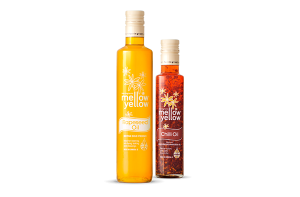 Oils
Oils Rapeseed Oil
Rapeseed Oil Chili Oil
Chili Oil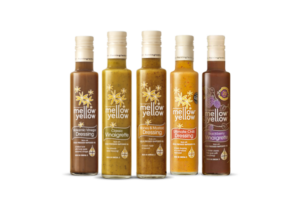 Dressings
Dressings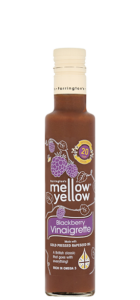 Blackberry Vinaigrette
Blackberry Vinaigrette Classic Vinaigrette
Classic Vinaigrette Balsamic Dressing
Balsamic Dressing Honey & Mustard
Honey & Mustard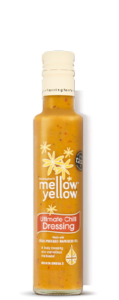 Ultimate Chilli Dressing
Ultimate Chilli Dressing